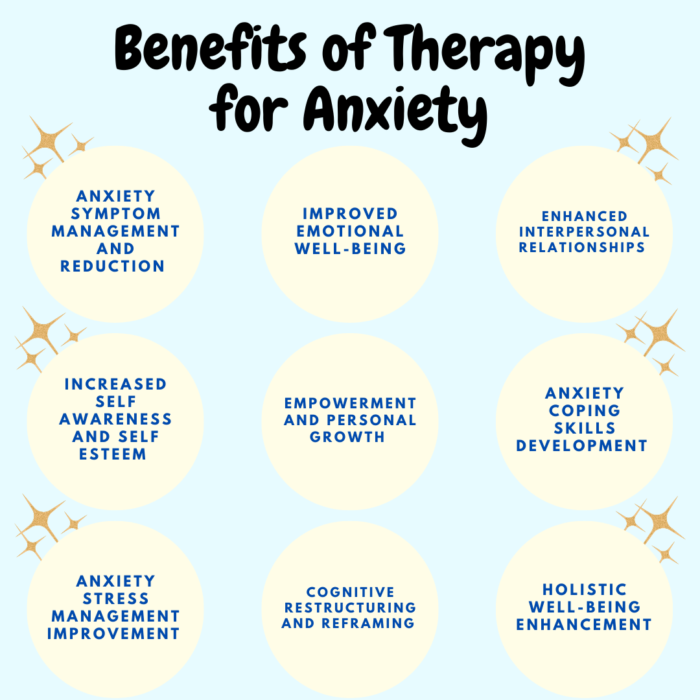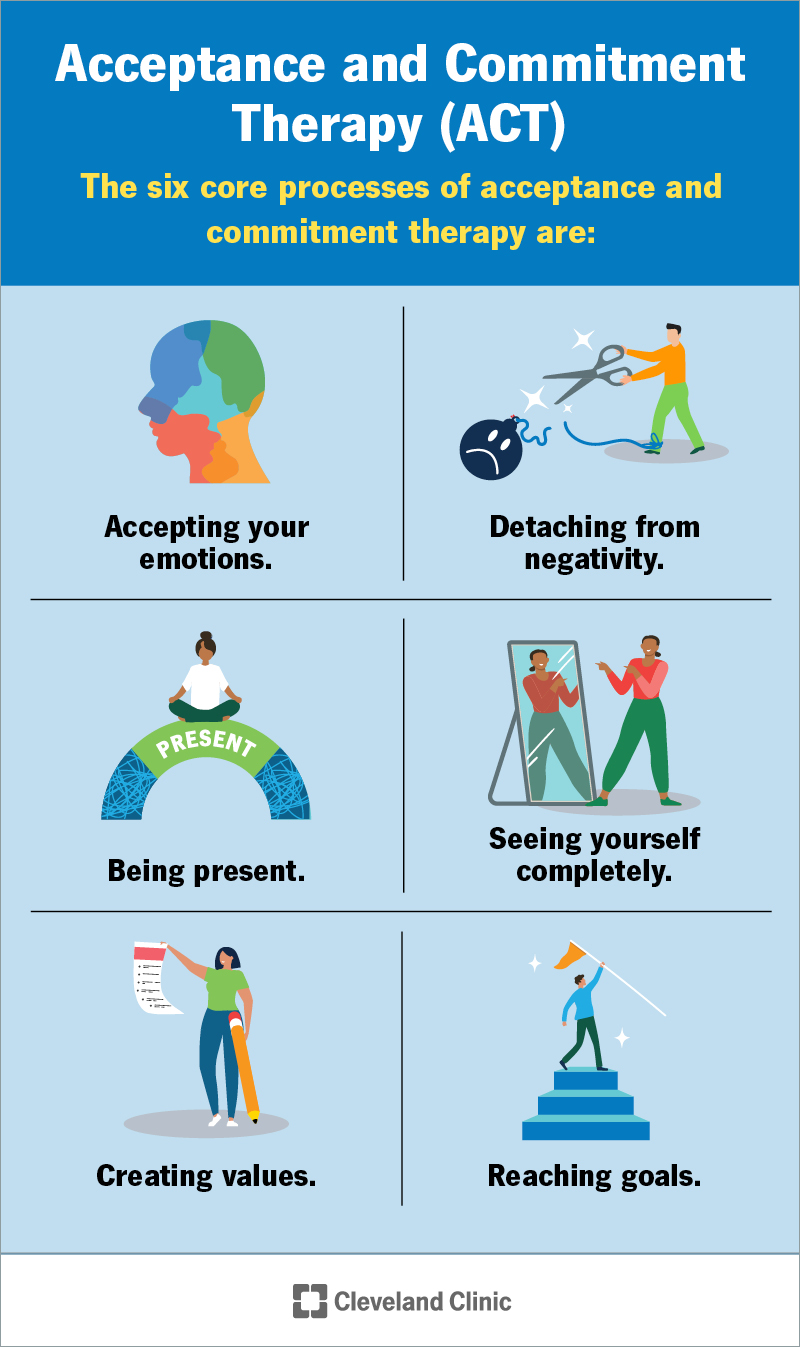Discover meaningful relief with a licensed therapist for anxiety you can trust
Discover meaningful relief with a licensed therapist for anxiety you can trust
Blog Article
Exploring Different Strategies in Therapy for Anxiousness Disorder for Long-term Adjustment
When taking on stress and anxiety problems, it's important to discover a range of counseling methods. Each method uses special understandings and devices to assist you manage your signs and symptoms properly. You could find that combining methods can generate the very best outcomes. Nevertheless, comprehending the nuances of these methods is crucial to fostering long-term adjustment. What if the best combination could release a brand-new level of psychological health for you?
Recognizing Anxiety Conditions: A Brief Summary
Anxiety problems, which impact millions of people worldwide, can considerably affect day-to-day live. You could experience frustrating feelings of anxiety or stress that appear irrepressible. These sensations can result in physical signs and symptoms like a racing heart, sweating, and even lightheadedness. Typical kinds of stress and anxiety conditions consist of generalized anxiety problem, panic attack, and social anxiety condition. Each has one-of-a-kind indications, however they all share a tendency to disrupt your routine and relationships.Understanding the source of your anxiousness is vital. It could come from genetics, brain chemistry, or life experiences. Identifying your triggers can aid you manage your actions better. It's crucial to keep in mind that you're not alone in this struggle. Many individuals face similar difficulties, and looking for help is a solid step toward feeling much better. By learning more about stress and anxiety conditions, you're already on the path to understanding and handling your condition a lot more effectively.
Cognitive-Behavioral Therapy: Testing Adverse Idea Patterns

Identifying Adverse Thought Triggers
Acknowledging the certain triggers behind your adverse thoughts can be vital in taking care of stress and anxiety when you come across moments of distress. Beginning by paying focus to circumstances that provoke feelings of worry or concern. Is it a crowded room, an approaching target date, or a conversation with specific people? Take down these circumstances in a journal. This will certainly help you identify patterns in your reasoning. Notice physical experiences that accompany your adverse ideas, like an auto racing heart or rigidity in your chest. By pinpointing these triggers, you gain understanding into what's fueling your anxiousness. Recognizing these connections is the very first step in challenging those ideas and ultimately restoring control over your psychological reactions.

Changing Thoughts With Positives
Challenging negative idea patterns is a vital step in transforming your frame of mind and minimizing anxiety. You may frequently locate on your own trapped in cycles of self-doubt or catastrophic thinking. Rather than allowing these ideas determine your sensations, method replacing them with reasonable choices or favorable affirmations. When you assume, "I can't handle this," shift it to, "I can take care of obstacles one step at a time." This easy adjustment can substantially impact your emotion. Routinely recognizing and responding to these negative thoughts aids develop a healthier inner discussion. Keep in mind, it takes time and effort, yet continually practicing this technique can bring about long lasting change, empowering you to face stress and anxiety with renewed confidence and resilience
Building Coping Techniques With Each Other
Replacing adverse thoughts is just the beginning of managing stress and anxiety properly. To develop enduring adjustment, you need to develop coping methods that empower you. Cognitive-Behavioral Treatment (CBT) assists you identify and test those purposeless thought patterns. With each other, you and your therapist can explore how these ideas influence your feelings and behaviors.Start by developing functional techniques, like journaling or mindfulness workouts, that enable you to face anxiety head-on. When you encounter your concerns slowly, you'll find out to react differently.

Mindfulness and Acceptance-Based Approaches: Cultivating Present-Moment Awareness
As you browse the intricacies of stress and anxiety, integrating mindfulness and acceptance-based techniques can significantly enhance your capacity to cultivate present-moment awareness. By focusing on the below and currently, you'll find that you can observe your thoughts and feelings without judgment. This practice helps you recognize your anxiousness without feeling bewildered by it.Engaging in mindfulness exercises, such as deep breathing, body scans, or guided reflections, enables you to ground yourself in your present experience. Acceptance-based techniques encourage you to embrace your feelings as opposed to deal with against them. They shed their power over you.Incorporating these practices right into your day-to-day regimen can transform how you react to anxiety when you accept your sensations. You'll create resilience and learn to navigate difficult circumstances with better ease. Inevitably, growing present-moment understanding lays the foundation for long lasting change, equipping you to lead a much more fulfilling life.
Direct Exposure Treatment: Facing Concerns Progressively
Exposure therapy helps you challenge your fears in a progressive way, making it less overwhelming. You'll learn strategies to deal with anxiety-provoking scenarios detailed, while likewise building coping techniques to manage your responses. This method equips you to take control and decrease stress and anxiety gradually.
Progressive Exposure Techniques
When encountering stress and anxiety, slowly challenging your worries can be a powerful way to restore control. This technique, referred to as gradual exposure, involves gradually exposing yourself to the scenarios or objects that trigger your stress and anxiety. Begin with much less daunting circumstances and progressively work your method as much as more tough ones. If you're afraid of public talking, you could begin by speaking in front of a mirror, after that advance to sharing thoughts with a close friend, and ultimately deal with a small group. Each action assists desensitize you to the click here concern, developing your confidence in time. Bear in mind, it's important to pace yourself and commemorate little success as you move through this procedure, strengthening your capacity to take care of anxiety properly.
Structure Coping Strategies
Structure efficient coping strategies is crucial for managing anxiousness, especially as you challenge your anxieties slowly. One effective method is direct exposure therapy, where you start by facing your fears in a regulated fashion. Start with much less daunting situations and slowly function your way approximately even more tough situations. This gradual exposure assists desensitize you to stress and anxiety sets off, making them less overwhelming.Incorporate relaxation strategies, such as deep breathing or mindfulness, to relax your mind throughout exposure. Track your progression, celebrating tiny victories in the process to improve your confidence. Keep in mind, it's alright to take your time; the objective isn't excellence however stable renovation. By constructing these approaches, you'll equip yourself to navigate anxiousness and accept life extra completely.
Psychodynamic Treatment: Discovering Origin of Anxiety
Psychodynamic therapy explores the subconscious mind, exposing the source of your stress and anxiety - Counseling services for anxiety. By analyzing your ideas, sensations, and previous experiences, this strategy assists you discover underlying conflicts and unsettled problems that might add to your existing anxiety. You'll deal with a therapist to explore childhood experiences, partnerships, and psychological patterns that form your actions today.As you get understanding right into these deeper layers of your mind, you'll begin to recognize exactly how previous occasions influence your existing actions. This understanding can lead to catharsis, allowing you to refine feelings you could have suppressed.Through the therapeutic partnership, you can additionally determine defense reaction that might have created in time, supplying a clearer course to alter. Eventually, psychodynamic treatment furnishes you with the tools to address your anxiety at its core, promoting enduring change in your psychological wellness
Integrative and Holistic Techniques: Combining Strategies for Greater Effectiveness
Integrating numerous therapeutic techniques can boost your journey towards managing anxiety more properly. By incorporating aspects from cognitive-behavioral treatment, mindfulness methods, and all natural strategies, you can create an individualized approach that addresses your one-of-a-kind demands. For example, you may utilize cognitive-behavioral methods to test negative thought patterns while including mindfulness exercises to ground yourself in the existing moment.Additionally, exploring holistic methods such as yoga or meditation can promote relaxation and decrease anxiousness signs and symptoms. This blend allows you to develop higher self-awareness and resilience.Experimenting with these varied techniques can assist you discover what resonates most with you. Keep in mind, it's regarding locating a synergy that functions, as opposed to adhering to a single approach. This integrative technique not just supplies instant alleviation but likewise fosters long-lasting skills for managing stress and anxiety, equipping you to reclaim control over your life.
The Function of Support Equipments: Structure Strength With Link
While it might appear that handling anxiety is a solitary trip, having a strong support system can play a necessary function in your strength. Surrounding yourself with empathetic good friends, family, or support system develops a secure room where you can openly share your sensations and experiences. When you get in touch with others, you remind yourself that you're not alone in this struggle.These connections provide encouragement and can give useful coping approaches that have helped others. It's additionally a chance to acquire perspective; friends can aid you see situations differently, reducing feelings of isolation.Moreover, psychological support fosters a sense of belonging, which can greatly relieve anxiety signs and symptoms. By leaning on your support group, you can build strength and tackle challenges better. Keep in mind, reaching out for help suggests stamina, and it can make all the distinction in your journey toward taking care of anxiety.
Frequently Asked Concerns
What Are the Typical Signs And Symptoms of Stress And Anxiety Disorders?
You may experience restlessness, exhaustion, problem concentrating, irritability, muscle mass tension, and sleep disturbances. Physical signs can include fast heart beat, sweating, and shivering. Recognizing these indicators early can help you seek suitable support and therapy.

How Long Does Therapy Typically Last for Stress And Anxiety Conditions?
Therapy for stress and anxiety conditions usually lasts anywhere from a couple of weeks to several months. It really depends upon your individual requirements, development, and the methods your specialist utilizes to aid you handle your stress and anxiety successfully.
Can Drug Be Made Use Of Together With Treatment for Stress and anxiety?
Yes, medication can most definitely be utilized along with treatment for anxiety. Integrating both strategies usually enhances therapy effectiveness, aiding you manage signs and symptoms while discovering underlying concerns through counseling. Always consult your doctor for tailored recommendations.
Exist Self-Help Approaches for Managing Stress And Anxiety?
Yes, there are several self-help approaches for handling anxiety. You can practice mindfulness, involve in regular exercise, preserve a balanced diet regimen, establish a regular, and utilize deep breathing strategies to help lower anxiousness symptoms effectively.
Exactly how Do I Know if I Required Expert Help for Stress And Anxiety?
You ought to think about seeking expert help for anxiousness if it interferes with day-to-day live, triggers considerable distress, or if self-help techniques aren't functioning. Count on your impulses; getting to out can result in better coping skills and support. Common kinds of anxiety disorders include generalised stress and anxiety condition, panic disorder, and social anxiousness condition. When you encounter moments of distress, acknowledging the specific triggers behind your unfavorable ideas can be essential in taking care of anxiety. Changing unfavorable thoughts is just the beginning of handling anxiety properly. By examining your ideas, sensations, and previous experiences, this technique aids you reveal underlying problems and unsettled issues that might contribute to your present anxiousness. It's likewise a chance to acquire perspective; good friends can assist you see scenarios differently, decreasing sensations of isolation (Counseling services for anxiety).Moreover, emotional assistance fosters a feeling of belonging, which can considerably relieve anxiousness symptoms
Report this page